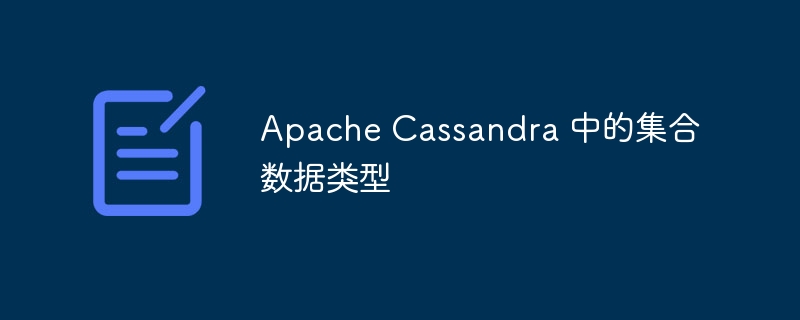

We will look at the Cassandra collection data type tutorial in our Cassandra journey. In this article, we will learn about Cassandra’s Collection data type. These data types have the same meaning as arrays and structures in C, C, etc.
Additionally, we will discuss Cassandra collection data types using lists, sets, and maps.
So, let’s start with the Cassandra collection data type.
In Cassandra, a collection data type is essentially a storage container for multiple values. Typically, Cassandra-CQL collection data types are defined by a single variable. The variable itself has a range of values.
Lists, sets and maps are several collection data types. Perform a wide range of operations on these Cassandra collection data types. These include create, insert, update, and verify operations.
Values of this data type are saved in list form. The list contains multiple copies of a single value. For list data types, there is only one rule.
Elements cannot be modified sequentially. When a value is stored in a list, the element is assigned a specific index. These indexes can be used to obtain values.
In Cassandra, one can create a table with a list data type using the CREATE TABLE command. There may be many columns in the table. The syntax for creating a table is.
cqlsh:<keyspace>>CREATE TABLE <table name>(column1 PRIMARY KEY,column2 list <data type>,column3 list <data type>,.....);
Construct a table containing the name, student number and branch of "college students".
cqlsh> USE keyspace1;
cqlsh:keyspace1> CREATE TABLE employee
... (EN int,
... NAME text,
... EMAIL LIST,
... PRIMARY KEY(EN),
... );
one |
Name |
|
|---|---|---|
|
|
|
Users can use the INSERT INTO command to add components to the table. Each value enclosed in square brackets is separated by commas. The syntax is -
cqlsh:<keyspace>> INSERT INTO <table name>(column1, column2, column3,....) VALUES('R1value1',['R1value1','R1value2','R1value3'...]['R1value11','R1value12','R1value13'...]...);
cqlsh:keyspace1> INSERT INTO college student (EN, NAME, EMAIL)
... VALUES(001,'hardik',{'hardi@gmail.com'});
cqlsh:keyspace1> INSERT INTO college student (EN, NAME, EMAIL)
... VALUES(002,'Ajites',{'ajit@mail.com'});
cqlsh:keyspace1> INSERT INTO college student (EN, NAME, EMAIL)
... VALUES(003,'Pushpa',{'tears@mail.com'});
one |
Name |
|
|---|---|---|
001 |
Hardik |
hardi@gmail.com |
002 |
Ajites |
ajit@mail.com |
003 |
Pushpa |
tears@mail.com |
Cassandra's UPDATE command is used to update the values of certain table columns. The updated syntax is as follows.
cqlsh:<keyspace> UPDATE<table name> SET <column2>=<column2>+['value'] where <column1>='some value';
cqlsh:keyspace2>UPDATE college student SET EMAIL=EMAIL+['hardikgupta.1@gmail.com'] where EN=001;
one |
Name |
|
|---|---|---|
001 |
Hardik |
hardikgupta.1@gmail.com |
002 |
Ajites |
ajit@mail.com |
003 |
Pushpa |
tears@mail.com |
Users can use the SET Cassandra collection data type to store collections of elements. After execution, the components of the collection are returned in sorted order.
Users can use the construct command with the following syntax to create the table containing the set.
cqlsh:<keyspace> CREATE TABLE<table name> (column1 PRIMARY KEY, column2 set <data type>, column3 set <data type>.....);
Construct a table containing the name, student number and branch of "college students".
cqlsh> USE keyspace2;
cqlsh:keyspace2> CREATE TABLE employee
... (EN int,
... NAME text,
... EMAIL LIST<text>,
... PRIMARY KEY(EN),
... );
one |
Name |
|
|---|---|---|
|
|
|
INSERT INTO command is used with the following syntax to insert values into a collection.
cqlsh:<keyspace>> INSERT INTO <table name>(column1, column2, column3...) VALUES('R1value',{'R1value1', 'R1value2',..},{ 'R1value11', 'R1value12',..}....);
>
cqlsh:keyspace2> INSERT INTO college student (EN, NAME, EMAIL)
... VALUES(001,'hardik',{'hardi@gmail.com'});
cqlsh:keyspace2> INSERT INTO college student (EN, NAME, EMAIL)
... VALUES(002,'Ajites',{'ajit@mail.com'});
cqlsh:keyspace2> INSERT INTO college student (EN, NAME, EMAIL)
... VALUES(003,'Pushpa',{'tears@mail.com'});
one |
Name |
|
|---|---|---|
001 |
Hardik |
hardi@gmail.com |
002 |
Ajites |
ajit@mail.com |
003 |
Pushpa |
tears@mail.com |
Users can use this syntax to update content in the collection.
cqlsh:<keyspace>>UPDATE <table name> SET <column2>=<column2>+['value'] where <column1>='some value';
cqlsh:keyspace2>UPDATE college student SET EMAIL=EMAIL+['hardikgupta.1@gmail.com'] where EN=001;
one |
Name |
|
|---|---|---|
001 |
Hardik |
hardikgupta.1@gmail.com |
002 |
Ajites |
ajit@mail.com |
003 |
Pushpa |
tears@mail.com |
一对键值项存储在映射(Cassandra 集合数据类型)中。
用户可以使用以下语法的“构造”命令来创建带有地图的表。
cqlsh:<keyspace> CREATE TABLE<table name> (column1 PRIMARY KEY, column2 map <type, data type>, column3 map <type, data type>.....);
构建一个表,其中包含“大学生”的名称、学号和分支。
cqlsh> USE keyspace3;
cqlsh:keyspace3> CREATE TABLE employee
... (EN int,
... NAME text,
... EMAIL LIST,
... PRIMARY KEY(EN),
... );
一个 |
姓名 |
电子邮件 |
|---|---|---|
|
|
|
INSERT INTO 命令与以下语法一起使用,将值插入到映射中。
cqlsh:<keyspace>> INSERT INTO <table name>(column1, column2, column3...) VALUES('R1value',{'R1value1':'R1value1' ,R1value2:'R1value01',..},{ 'R1value11':'R1value011','R1value12':'R1value012',..}....);
cqlsh:keyspace3> INSERT INTO college student (EN, NAME, EMAIL)
... VALUES(001,'hardik',{'hardi@gmail.com'});
cqlsh:keyspace3> INSERT INTO college student (EN, NAME, EMAIL)
... VALUES(002,'Ajites',{'ajit@mail.com'});
cqlsh:keyspace3> INSERT INTO college student (EN, NAME, EMAIL)
... VALUES(003,'Pushpa',{'tears@mail.com'});
一个 |
姓名 |
电子邮件 |
|---|---|---|
001 |
哈迪克 |
hardi@gmail.com |
002 |
阿吉特斯 |
ajit@mail.com |
003 |
普什帕 |
tears@mail.com |
使用此技术,用户可以修改集合的内容。
cqlsh:<keyspace>>UPDATE <table name> SET <column2>=<column2>+['value1':'value2'] where <column1>='some value';
cqlsh:keyspace3>UPDATE college student SET EMAIL=EMAIL+['hardikgupta.1@gmail.com'] where EN=001;
一个 |
姓名 |
电子邮件 |
|---|---|---|
001 |
哈迪克 |
hardikgupta.1@gmail.com |
002 |
阿吉特斯 |
ajit@mail.com |
003 |
普什帕 |
tears@mail.com |
这是 Apache Cassandra 中的三种集合数据类型。通过 Cassandra 集合可以轻松进行任务管理。集合允许存储大量项目。
The above is the detailed content of Collection data types in Apache Cassandra. For more information, please follow other related articles on the PHP Chinese website!




